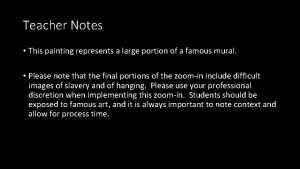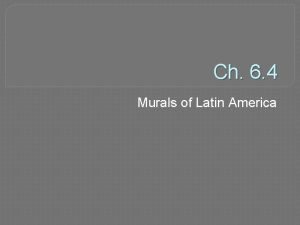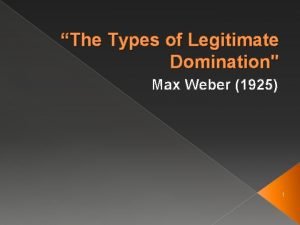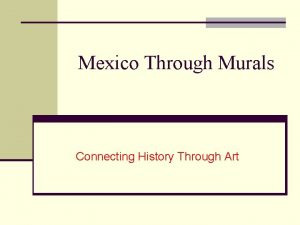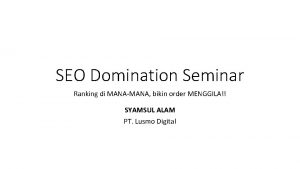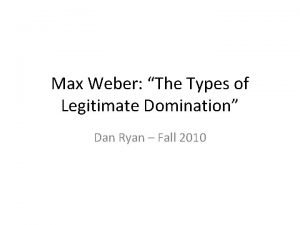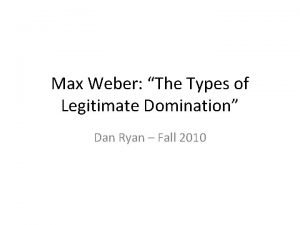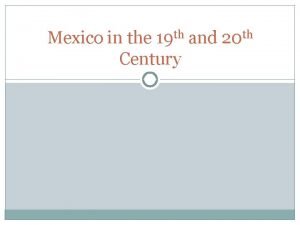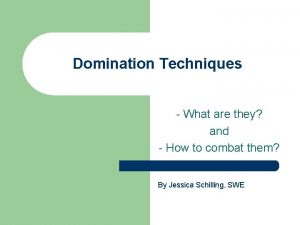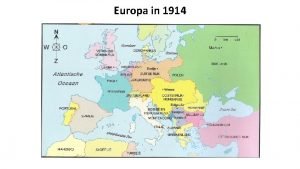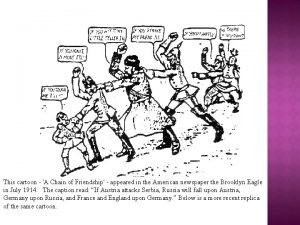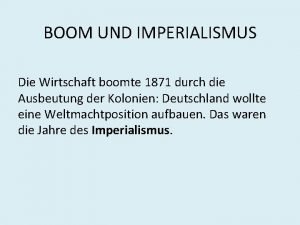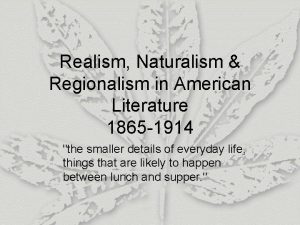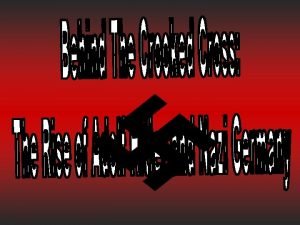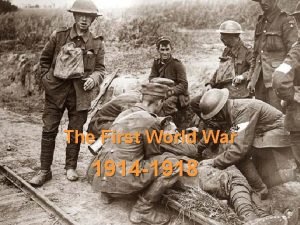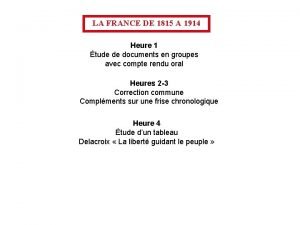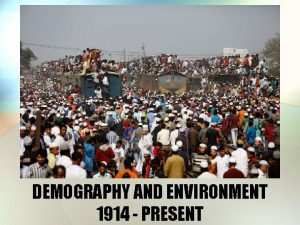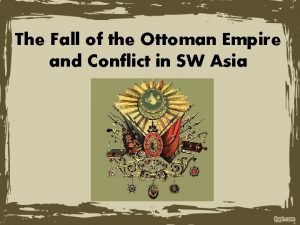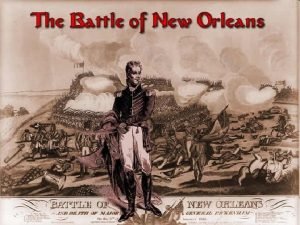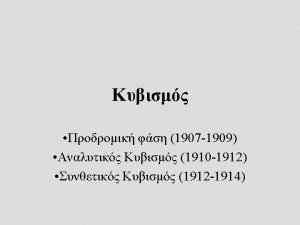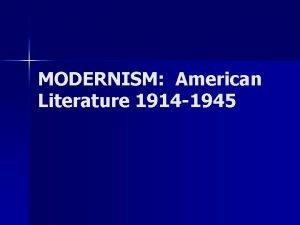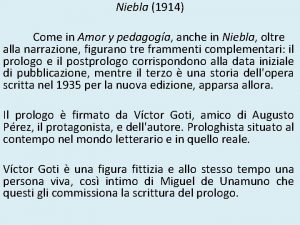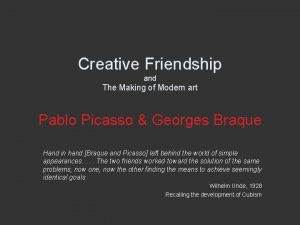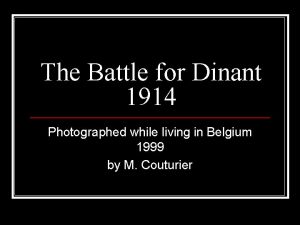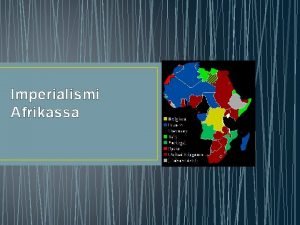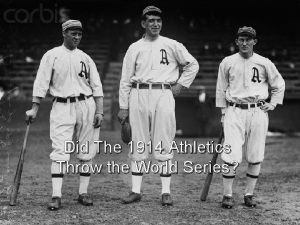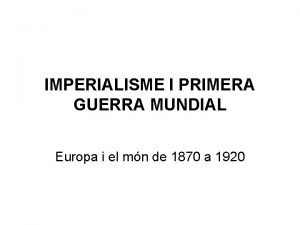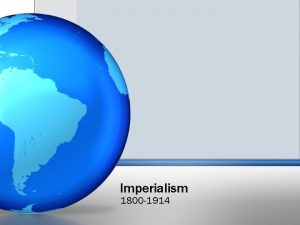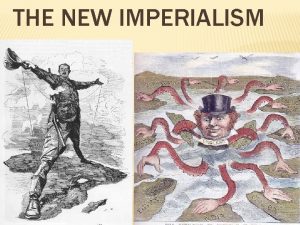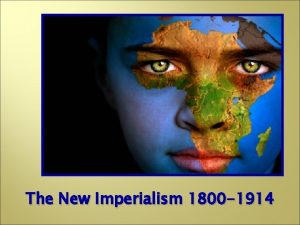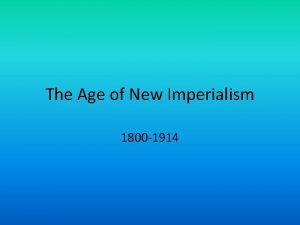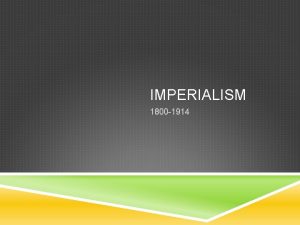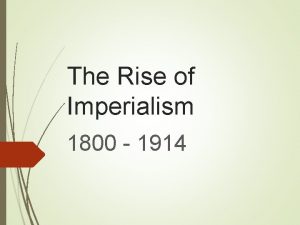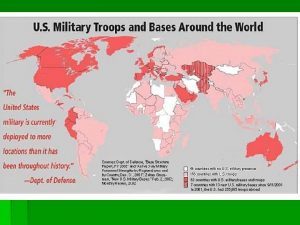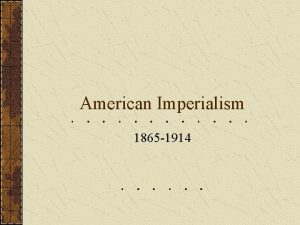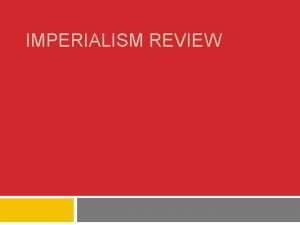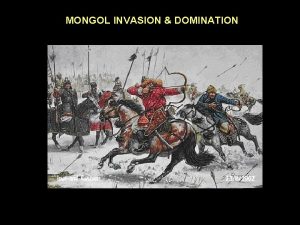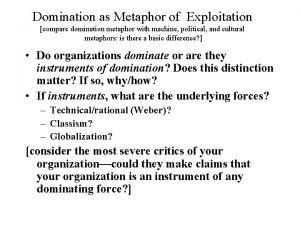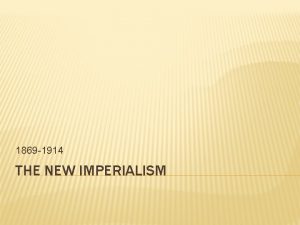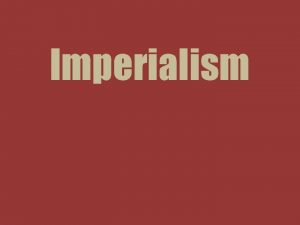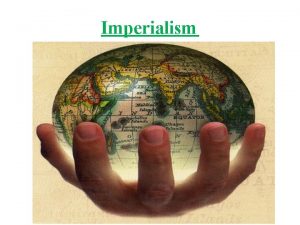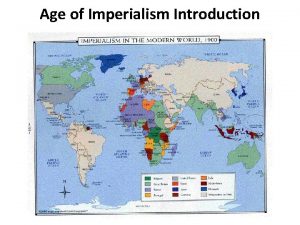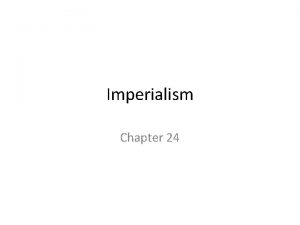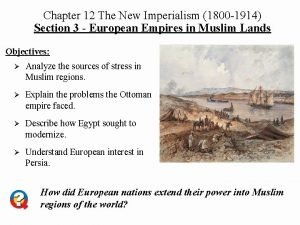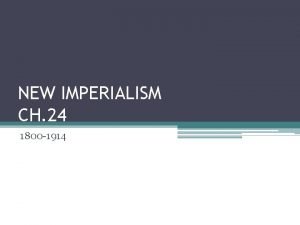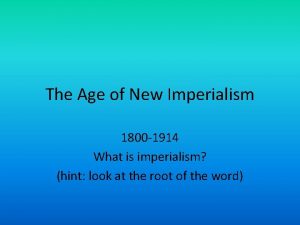THE NEW IMPERIALISM 1800 1914 Imperialism The domination










































- Slides: 42

THE NEW IMPERIALISM (1800 -1914)

Imperialism: The domination of 1 country of the politics economy, and culture over another country

Europeans: Military and Industrial POWER ARMED WITH: 1. ADVANCES IN 2. SCIENCE, 3. TECHNOLOGY 4. INDUSTRY, 5. TRANSPORTATION, 6. COMMUNICATION

CAUSES OF IMPERIALISM Encouraged by their new ECONOMIC AND MILITARY strength from the I. R. European powers will set out to dominate the world Economic Causes The I. R. created NEEDS and DESIRES that spurred overseas expansion Manufacturers wanted raw resources such as rubber, petroleum, steel, and palm oil for machinery

POLITICAL AND MILITARY CAUSES New steam powered merchant ships and naval vessels needed bases around the world to take on coal and supplies and to protect their investments Nationalism played a role as well------Nations would compete to increase their PRESTIGE

RELIGIOUS GOALS MANY WESTERNERS FELT GENUINE CONCERN FOR THEIR “LITTLE BROTHERS” ACROSS THE SEAS THEY WANTED TO SPREAD WHAT THEY SAW AS THE BLESSINGS OF WESTERN CIVILIZATION SHARED: CHRISTIANITY, MEDICINE, LAW

APPLYING SOCIAL DARWINISM TO IMPERIALISM THERE WAS A GROWING SENSE OF WESTERN RACIAL SUPERIORITY BASED UPON CHARLES DARWIN’S “SURVIVAL OF THE FITTEST” EUROPEAN DOMINANCE WAS NATURE’S WAY OF IMPROVING HUMAN SPECIES MANY STOOD ON THIS TO JUSTIFY EUROPEAN IMPERIALISM

How were European MANY OLDER CIVILIZATION WERE IN THE DECLINE: OTTOMAN (MIDDLE EAST) MUGHAL (INDIA) QING (CHINA) WARS AMONG AFRICAN PEOPLES ALONG WITH THE DEVASTATION OF THE SLAVE TRADE HAD UNDERMINED ESTABLISHED EMPIRES KINGDOMS AND CITY STATES Nations Able to Expand

Western Advantages EUROPEAN POWERS HAD STRONG ECONOMIES WELL ORGANIZED MILITARIES POWERFUL ARMIES AND NAVIES NEW TECHNOLOGIES: MAXIM MACHINE GUN – STEAM DRIVEN WAR SHIPS – REPEATING RIFLES

RESISTING IMPERIALISM AFRICANS AND ASIANS STRONGLY RESISTED EUROPEAN DOMINANCE • Some tried to “fight” the invaders • Tried to strengthen and reform their traditions • Many Africans and Asians organized nationalists groups to expel imperialism • They were NO match for European superior advancements Think About It: In what ways were the European nations being hypocritical in their Imperialistic movements?

FORMS OF IMERIAL RULE DIRECT RULE (France) SENDING THEIR OWN OFFICIALS AND SOLDIERS TO ADMINISTER THEIR COLONY INDIRECT RULE (British) Used sultans, chiefs, and other local rulers Protectorate Local rulers were left in place but were expected to follow the advice of European advisors

HOW MIGHT THIS BRITISH PROPAGANDA PIECE PORTRAY HOW EUROPEANS VIEWED AFRICANS ? EXPLAIN.

12. 2 THE PARTITION OF AFRICA

FRANCE, BRITAIN, GERMANY AND OTHER EUROPEAN POWERS CARVE UP AFRICA European Contact Increase • Since the 1500 Europeans traded along the African coast-----Africans wanted to trade with Europeans but didn’t want to house them. • Resistance by Africans, difficult geography, and diseases all kept Europeans from moving inland • Medical advances and river steamships changed all that

Moving Inland Mungo Park • Explorers were fascinated with African geography and wanted to map the famous river of the Niger, Nile, and Congo • Catholic and Protestant missionaries seek to win Africans to Christianity • Built schools and churches and were overall sincere in their efforts • Focused on the evil of the slave trade • Degraded many African religions and along with them their traditions Richard Burton

DR. DAVID LIVINGSTON The best known African explorer who immersed himself in all of the African societies he encountered for 30 years • Met Africans with great sympathy which is why he was liked for the most part • Relentlessly opposed the slave trade • Blazed the trail for other explorers • In 1869 Henry Stanley trekked into central Africa to find Livingston who had not been heard from in years. When he found him he uttered the now legendary phrase, “Dr. Livingston, I presume? ”

A SCRAMBLE FOR COLONIES King Leopold III of Belgium hired Stanly to make trade treaties with African leader • SOON AFTER, OTHER EUROPEAN NATIONS SCRAMBLED TO CLAIM LANDS IN THE REGION Berlin Conference (1884): To avoid bloodshed, European power met in Berlin, Germany to partition African (no Africans were invited) • In 20 years European powers had partitioned the entire continent • Redrew African map with no consideration of traditional and national borders or ethnic boundaries

AFRICANS RESIST IMPERIALISM Europeans met armed resistance all across the continent • • • Algerians v. French British v. Asante and Zulus Germany v. Yao and Hereo Ethiopia: An ancient Christian kingdom in East Africa stayed up with modernization and successfully stopped the Italian invaders

Samori Toure: Algerian Asante Queen who relentlessly fought the British Nehanda: Military leader of the Shona (Eventually captured and executed by the British Reforming ruler of Ethiopia who modernized his country and held off Italian army

Impact of Imperialism • Complete Exploitation of Africans and African recourses • Battles and Wars broke out between Europeans and Africans ---Thousands of deaths • Government run by whites – racial segregation (South Africa until 1993) • Still other European nations will join the fight.

POLITICAL CARTOON ACTIVITY WE HAVE SEEN NUMEROUS POLITICAL CARTOONS THIS PPT DEPICTING THE PARTITION OF AFRICA CREATE YOUR OWN POLITICAL CARTOON DEPICTING THE PARTITION OF AFRICA

EUROPEANS CLAIM MUSLIM REGIONS Ottoman Empire in the Middle East The Safavid Empire in Persia The Mughals in India v. National uprisings within Empire v All were in decline due to European encroachment v Some local rulers strengthened their power

BRITISH CONTROL THE SUEZ CANAL Great Britain bought Egyptian shares of the SUEZ CANAL and had main control of it WHY IS THIS SIGNIFICANT

12. 4 BRITISH TAKE OVER INDIA The British East India Comp. won trading rights on fringe of Mughal Empire in early 1600 s As Mughal Empire declined Britain ruled ¾ of India

EXPLOITING INDIAN DIVERSITY Britain was able to conquer India by exploiting its diversity after the crumble of the Mughal Empire By pitting rival princes against each other, India was unable to unite

BRITISH BRING WESTERNIZATION TO INDIA British maintained peace, improved roads, and reduced banditry Introduced western education and legal procedures Missionaries tried to convert Indians to Christianity Worked to end slavery and the caste system. Improve the roles of women in the home Banned sati – Hindu widow threw herself on husband’s funeral fire

BREAKING HINDU TABOOS British took some unpopular moves v Ordered sepoy’s to serve in British army at home or abroad. v Indian soldiers in British army v Passed law allowing Hindu women to remarry which was viewed as a Christian conspiracy to undermine their beliefs v Cartages we lined with animal grease from cows and pigs which was forbidden to eat for Hindus

SEPOY REBELLION Angry sepoys rose against their British officers and met in Delhi, the old Mughal capital Rebellion broke out against the British in India. Some placed sepoys massacred British men, women, and children British soon rallied and crushed the revolt, taking terrible revenge from their earlier losses. Scorching villages and slaughtering thousands of unarmed Indians IMPACT: 1. Fear, Hatred, and Mistrust on both sides 2. India, now under direct British Rule, sending more troops 3. Developed India for own economic benefit

BRITISH RAJ Rule of Great Britain in India Used British viceroys in India govt. in the name of British queen. British officials held top position in govt. India = “jewel” of the British Crown Saw India as a market and as source of raw material. MAIN CON: Take their resources, finish them in the homeland, and sell them back to Indian(harsh cycle for the Indians)

BRITISH REFORMS Britain improved roads and transportation including Railways in India New methods of agriculture and farming • Deforestation of India Instead of growing food, Britain's forced farmers to grow cash crops to be sold on world stage such as cotton and jute q led to famine Better healthcare and food production led to population growth

INDIAN NATIONALISM GROWS By the late 1800 s Western educated Indians had the reverse affect and spearheaded the Indian nationalist movements Schooled in Western Ideals such as democracy, freedom and equality, they dreamed of ending imperial rule Indian National Congress: Believed in peaceful protest to gain their end of an independent India • Muslim League: Branched off for fear of Hindu rule in Indian National Congress

CHINA AND THE NEW IMPERIALISM 12. 5

CHINA China traditionally had a trade surplus with Europeans but EU wanted to flip this trend v China was entering a period of decline v Europe was about to exercise its industrial military on China OPIUM WAR The British used opium grown in India to trade for silver in China v Many of the Chinese people had grown addicted to the drug. Wealth was flowing out of China to feed their addiction v The Chinese govt. outlawed the trading of opium v The British refused insisting on the right of free trade

THE OPIUM WAR In 1839 Chinese Warships clashed with British merchants on the ports and river ports, triggering the Opium War v They were NO match for Industrialized weaponry IMPACT: The Treaty of Nanjing 1. Forced China to sign unfair trading rights 2. British were to paid indemnity 3. Gained the island of Hong Kong 4. British citizens were allowed to live in China but not accountable to Chinese laws v Led to more wars with China which led to USA, Russia, and France gaining open ports to trade with China

THE TAIPING REBELLION 1850 -1864 The Qing Dynasty was on rapid decline § Hardships: Poorly maintained canals and irrigations systems, tax evasion by rich, extravagant imperial courts, govt. corruption et § Misery among the Chinese peasants increased Taiping Rebellion: Peasant revolt that tried to overthrow Qing but failed after 14 years of winning large parts of China § Considered the worst peasant revolt in history with 2030 million deaths IMPACT 1. Blow to the dynasty 2. Russia and European cont to apply pressure

MOVEMENT Ci Xi , a strong ruler, launched reforms in China to industrialize q Limited progress because the govt. supported traditional Confucius ways of life SINO-Japanese War : Japan committed to Westernize in 1868 and join the imperialistic powers. q Japan gained island of Taiwan from China q Signaled that China was WEAK

EUROPE CARVES UP CHINA France, Russia, G. B. and Germany all gained Chinese Territory OPEN DOOR Policy: USA advocated to Open Door Policy with China when it came to trading q No One Consulted with China

CONSERVATIVES BLAME REFORMERS Under Guang Xu, Chinese reformers attempted to modernize during the 100 Days of Reform § Encourage new industries § Education § Streamline govt. Conservatives blamed reformers for Western missionaries and threatening tradition Confucius values as well as the presence of foreign troops § They imprisoned the emperor and Ci Xi reestablished her traditional dominance

BOXER REBELLION 1899 Group of Chinese traditionalists trained in martial arts (Westerners called them BOXERS) rose up and began to attack Westerners across China A Multinational Force crushed the rebellion AFTERMATH/IMPACT 1. China once again had to make concessions to Europe 2. China was forced to modernize/change

PRACTICE SHORT ANSWER RESPONSE WAS BRITISH IMPERIALISM A GOOD OR BAD THING FOR THE NATIVE PEOPLES?

BAD RESPONSE LACKS: SPECIFIC EXAMPLES (KEY TERMS/PEOPLE/PLACES) DOESN’T ARTICULATE ITS PURPOSE OR STANCE ISN’T IN RIGHT FORMAT OR DOESN’T USE COMPLETE SENTENCES ISN’T SPECIFIC ENOUGH European imperialism was overall a bad thing for native peoples. European powers took over Native people and their things through imperialism. They killed many native people and took advantage of them. I think imperialism was an overall bad thing

GOOD RESPONSE European imperialization of the African and Indian people was a bad thing for the native peoples. During the mid-late 1800 s, European powers divided up Africa at the Berlin Conference w/o any African input. They redrew the boundaries in Africa with no consideration of African tribal boundaries. In attempt to increase their empires, European powers dominated the African peoples and their resistance efforts through superior Industrialized militaries particularly their maxim machine guns. Once they had the natives under control, they would strip them of their wealth, by taking their raw resources/ materials, ship them back to the mother country to be sold or processed into finished goods and even sold back to the native people. This vicious cycle was detrimental to the African/Indians economies
 Imperialism map 1914
Imperialism map 1914 Old vs new imperialism chart
Old vs new imperialism chart Old imperialism vs new imperialism chart
Old imperialism vs new imperialism chart Colonial domination diego rivera
Colonial domination diego rivera Colonial domination diego rivera
Colonial domination diego rivera Traditional legitimacy
Traditional legitimacy Colonial domination diego rivera
Colonial domination diego rivera Routinization of charisma definition
Routinization of charisma definition Seo domination
Seo domination Interviewer domination
Interviewer domination Different types of domination
Different types of domination The types of legitimate domination
The types of legitimate domination La domination macrocéphalique de paris
La domination macrocéphalique de paris Colonial domination diego rivera
Colonial domination diego rivera 8 methods of tax attorney domination - indorecipe
8 methods of tax attorney domination - indorecipe Domination techniques
Domination techniques Ottomaanse rijk 1914
Ottomaanse rijk 1914 The chain of friendship cartoon answers
The chain of friendship cartoon answers Moda anilor 1930
Moda anilor 1930 Srbija od 1903 do 1914
Srbija od 1903 do 1914 Latviešu gleznotājs 1891-1964
Latviešu gleznotājs 1891-1964 Kolonien afrika 1914
Kolonien afrika 1914 Realism regionalism and naturalism
Realism regionalism and naturalism The courtyard of the old residency in munich
The courtyard of the old residency in munich Ekspresionizam u hrvatskoj književnosti
Ekspresionizam u hrvatskoj književnosti Map of europe 1914
Map of europe 1914 Colonial empires 1914
Colonial empires 1914 Frise chronologique 1815 à 1914
Frise chronologique 1815 à 1914 World population in 1914
World population in 1914 How did the ottoman empire fall
How did the ottoman empire fall 1814 took a little trip
1814 took a little trip Ma jolie
Ma jolie Negara triple entente 1914
Negara triple entente 1914 Map of europe 1914
Map of europe 1914 American literature modernism
American literature modernism Protagonista de niebla
Protagonista de niebla Picasso ma jolie 1914
Picasso ma jolie 1914 Lasted until 1914
Lasted until 1914 Battle of dinant
Battle of dinant Imperialismi afrikassa
Imperialismi afrikassa Jerusalem 607
Jerusalem 607 Pstuffy bunny
Pstuffy bunny Imperis colonials 1914
Imperis colonials 1914



